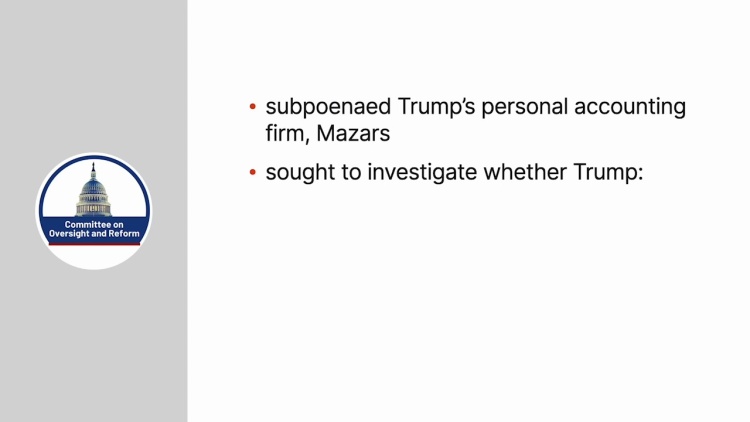Trump v. Mazars USA, LLP
United States Supreme Court
140 S. Ct. 2019 (2020)
- Written by Angela Patrick, JD
Facts
Through three committees, the House of Representatives (defendant) issued four subpoenas requesting personal banking and tax information about President Donald Trump, his family, and his businesses (collectively, the president) (plaintiffs) from third parties. First, the Financial Services Committee subpoenaed Deutsche Bank and Capital One, claiming it needed the private information to review the effectiveness of banking regulations and related laws intended to prevent terrorist financing and money laundering. Second, the Permanent Select Committee on Intelligence subpoenaed Deutsche Bank, claiming it needed the private information to investigate Russian efforts to undermine the United States political process. Third, the House Committee on Oversight and Reform subpoenaed accounting firm Mazars USA, LLP, claiming it needed the private information to investigate whether Trump had accurately disclosed his finances and conflicts of interest and to evaluate possible reforms to financial-disclosure laws for presidents and presidential candidates. The president filed a lawsuit challenging the three bank subpoenas and a separate lawsuit challenging the subpoena to Mazars. The president argued that the subpoenas lacked a legitimate legislative purpose and were a separation-of-powers violation. The president did not argue that the information was protected by executive privilege. In both lawsuits, the district court upheld the subpoenas. The appellate court in each case, the Second Circuit and the District of Columbia Circuit, affirmed that the subpoenas were valid because each subpoena served a valid legislative purpose. The United States Supreme Court granted certiorari to review both cases.
Rule of Law
Issue
Holding and Reasoning (Roberts, C.J.)
Dissent (Thomas, J.)
Dissent (Alito, J.)
What to do next…
Here's why 903,000 law students have relied on our case briefs:
- Written by law professors and practitioners, not other law students. 47,100 briefs, keyed to 995 casebooks. Top-notch customer support.
- The right amount of information, includes the facts, issues, rule of law, holding and reasoning, and any concurrences and dissents.
- Access in your classes, works on your mobile and tablet. Massive library of related video lessons and high quality multiple-choice questions.
- Easy to use, uniform format for every case brief. Written in plain English, not in legalese. Our briefs summarize and simplify; they don’t just repeat the court’s language.





